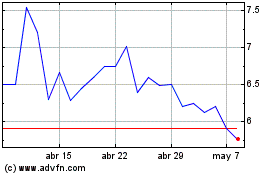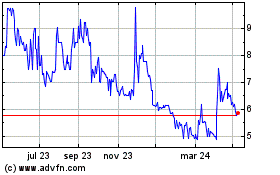TIDMSNG
RNS Number : 5326L
Synairgen plc
16 May 2022
For Media and Investors
Synairgen plc
('Synairgen' or the 'Company')
Synairgen presents detailed analysis of Phase 3 SPRINTER trial
evaluating SNG001 in hospitalised COVID-19 patients at ATS 2022
-- Post hoc analyses conducted in patient populations at greater
risk of progression to severe disease or death suggests that SNG001
may have an important clinical effect on top of standard of
care
Southampton, UK - 16 May 2022: Synairgen plc (LSE: SNG), the
respiratory company developing SNG001, an investigational
formulation for inhalation containing the broad-spectrum antiviral
protein interferon beta, today announces the first presentation of
the full data analysis from its Phase 3 SPRINTER trial evaluating
the efficacy and safety of SNG001 in patients hospitalised with
COVID-19.
SPRINTER (SG018; NCT04732949) was a global, randomised,
placebo-controlled, double-blind clinical trial assessing the
efficacy and safety of inhaled SNG001 for the treatment of adults
hospitalised due to COVID-19 who required treatment with
supplemental oxygen. The trial recruited a total of 623 patients
who were randomised to receive SNG001 (n=309) or placebo (n=314) on
top of standard of care (SOC).
The data from this pivotal trial will be presented today at the
Clinical Trials Symposium of the American Thoracic Society 2022
(ATS 2022) International Conference, being held in San Francisco,
California from 13-18 May 2022. A separate poster presentation is
scheduled for 17 May 2022.
Synairgen announced in February 2022 that the Phase 3 SPRINTER
trial did not meet the primary endpoints of discharge from hospital
and recovery. There was, however, an encouraging signal in
reduction in the relative risk (RRR) of progression to severe
disease or death within 35 days (25.7% [1] reduction in the
Intention-to-Treat population and 36.3% reduction in the Per
Protocol population). [2]
To assess the strength of this signal and identify specific
patient populations that might benefit most from treatment, post
hoc analyses were performed on groups of patients recognised to be
at greater risk of developing severe disease in hospital. These
analyses included patients >=65 years old, those with
co-morbidities associated with worse COVID-19 outcomes, and those
who, at baseline, despite receiving low flow oxygen, had clinical
signs of compromised respiratory function (defined as oxygen
saturation of <= 92% or respiratory rate >= 21
breaths/min).
These analyses showed stronger treatment effects with SNG001 in
these high-risk patient sub-groups, with the strongest effect
observed in those who had clinical signs of compromised respiratory
function. In these patients, who represented approximately
one-third of the SPRINTER trial population, SNG001 significantly
reduced the risk of progression to severe disease and death
compared to placebo by 70% in the Per Protocol population (Odds
Ratio (95% Confidence Interval) 0.23 (0.06, 0.98); p=0.046).
SNG001 was well tolerated in the SPRINTER trial with a
favourable safety profile consistent with previous studies:
-- The proportion of patients with any treatment-emergent
adverse events (TEAE) related to study treatment was 22.6% for
SNG001 vs. 25.4% for placebo.
-- The proportion of patients with any serious TEAE was 12.6% for SNG001 vs. 18.2% for placebo.
-- The proportion of patients with a serious respiratory [3]
TEAE was 4.7% for SNG001 vs. 9.9% for placebo.
Phillip Monk, Ph.D., Chief Scientific Officer of Synairgen,
said: "The post hoc analyses presented at the ATS conference today
suggest that SNG001 may be having a beneficial effect with respect
to prevention of severe disease or death. These results provide a
strong clinical rationale to continue to investigate SNG001 in a
trial evaluating progression and/or mortality in hospitalised
patients with COVID-19 and more widely in patients with severe
viral lung infections."
Tom Wilkinson, Chief Investigator of the SPRINTER trial and
Professor of Respiratory Medicine, University of Southampton, said:
" The improvement in standard of care for COVID-19 means that most
patients are currently discharged fairly rapidly from hospital;
however, this further analysis shows that some patients struggle in
their battle with the virus and show signs of respiratory
compromise, with faster breathing rates and lower oxygen
saturations, despite being on oxygen. For these higher-risk
patients, there remains an urgent need for new treatment options,
and this analysis suggests that SNG001 could be a potentially
efficacious treatment option for them ."
The full analysis of the Phase 3 SPRINTER trial data will be
submitted for publication in a peer-reviewed journal. A company
recording of the ATS presentation will be available on the
Synairgen website by 12:00 Pacific Daylight Time/20:00 British
Summer Time today, and for ATS members, the symposium recording
will be available on the ATS website.
SNG001 is not approved for use anywhere in the world.
For further information on the ATS International Conference
visit: https://conference.thoracic.org/
This announcement contains inside information for the purposes
of Article 7 of Regulation (EU) No. 596/2014 ('MAR').
For further enquiries, please contact:
Synairgen plc
Brooke Clarke, Head of Communications
Media@synairgen.com
Tel: + 44 (0) 23 8051 2800
finnCap (NOMAD and Joint Broker)
Geoff Nash, Kate Bannatyne, Charlie Beeson (Corporate
Finance)
Alice Lane, Sunil de Silva (ECM)
Tel: + 44 (0) 20 7220 0500
Numis Securities Limited (Joint Broker)
James Black, Freddie Barnfield, Duncan Monteith
Tel: + 44 (0) 20 7260 1000
Consilium Strategic Communications (Financial Media and Investor
Relations)
Mary-Jane Elliott, Jessica Hodgson, Namrata Taak
cscsynairgen@consilium-comms.com
Tel: +44 (0) 20 3709 5700
MKC STRATEGIES, LLC (US Media Relations)
Mary Conway
MConway@MKCStrategies.com
Tel: +1 516-606-6545
Notes for Editors
About SPRINTER (SG018) trial
The SPRINTER trial (SG018; NCT04732949) was a global Phase 3,
randomised, placebo-controlled, double-blind, clinical trial
assessing the efficacy and safety of inhaled SNG001 on top of
standard of care (SOC) for the treatment of adults hospitalised due
to COVID-19 requiring treatment with supplemental oxygen by mask or
nasal prongs. Patients requiring high-flow nasal oxygen therapy,
non-invasive ventilation, or endotracheal intubation (invasive
ventilation) at randomisation were excluded. COVID-19 was confirmed
using a validated molecular test for the presence of the SARS-CoV-2
virus.
About SNG001
SNG001 is a pH-neutral formulation of interferon-beta (IFN-beta)
for inhalation that is delivered directly into the lungs using a
mesh nebuliser, currently being investigated as a potential
host-directed antiviral treatment for patients hospitalised with
COVID-19. SNG001 has broad potential applicability for patients
hospitalised with respiratory symptoms due to viral infections such
as influenza, Respiratory Syncytial Virus (RSV) and
para-influenza.
The SARS-CoV-2 virus has been shown to suppress the production
of IFN-beta, a naturally-occurring protein that orchestrates the
body's antiviral defences, with the aim of evading host immune
responses. By administering IFN-beta into the lungs, the aim is to
correct this deficiency, potentially switching back on the lungs'
antiviral pathways to clear the virus. SNG001 has been shown to
demonstrate potent in vitro antiviral activity against a broad
range of viruses including SARS-CoV-2 and Alpha, Beta, Gamma, Delta
and Omicron variants.
About Synairgen
Synairgen is a UK-based respiratory company focused on drug
discovery, development and commercialisation. The Company's primary
focus is developing SNG001 (inhaled interferon beta) for the
treatment of severe viral lung infections, including COVID-19, as
potentially the first host-targeted, broad-spectrum antiviral
treatment delivered directly into the lungs. SNG001 has been
granted Fast Track status from the US Food and Drug Administration
(FDA). Founded by University of Southampton Professors Sir Stephen
Holgate, Donna Davies and Ratko Djukanovic in 2003, Synairgen is
quoted on AIM (LSE: SNG). For more information about Synairgen,
please see www.synairgen.com .
[1] This was reported as 27.1% in the topline analysis in
February 2022 but changed between 35- and 90-day database lock.
[2] The main reason patients were excluded from the Per Protocol
population was failure to receive two full doses in the first three
days of treatment .
[3] Respiratory, thoracic and mediastinal system organ class
This information is provided by RNS, the news service of the
London Stock Exchange. RNS is approved by the Financial Conduct
Authority to act as a Primary Information Provider in the United
Kingdom. Terms and conditions relating to the use and distribution
of this information may apply. For further information, please
contact rns@lseg.com or visit www.rns.com.
RNS may use your IP address to confirm compliance with the terms
and conditions, to analyse how you engage with the information
contained in this communication, and to share such analysis on an
anonymised basis with others as part of our commercial services.
For further information about how RNS and the London Stock Exchange
use the personal data you provide us, please see our Privacy
Policy.
END
MSCSFDESIEESEEI
(END) Dow Jones Newswires
May 16, 2022 02:01 ET (06:01 GMT)
Synairgen (LSE:SNG)
Gráfica de Acción Histórica
De Mar 2024 a Abr 2024

Synairgen (LSE:SNG)
Gráfica de Acción Histórica
De Abr 2023 a Abr 2024
